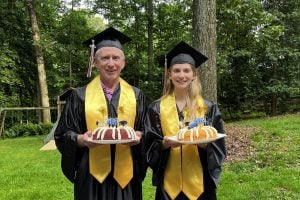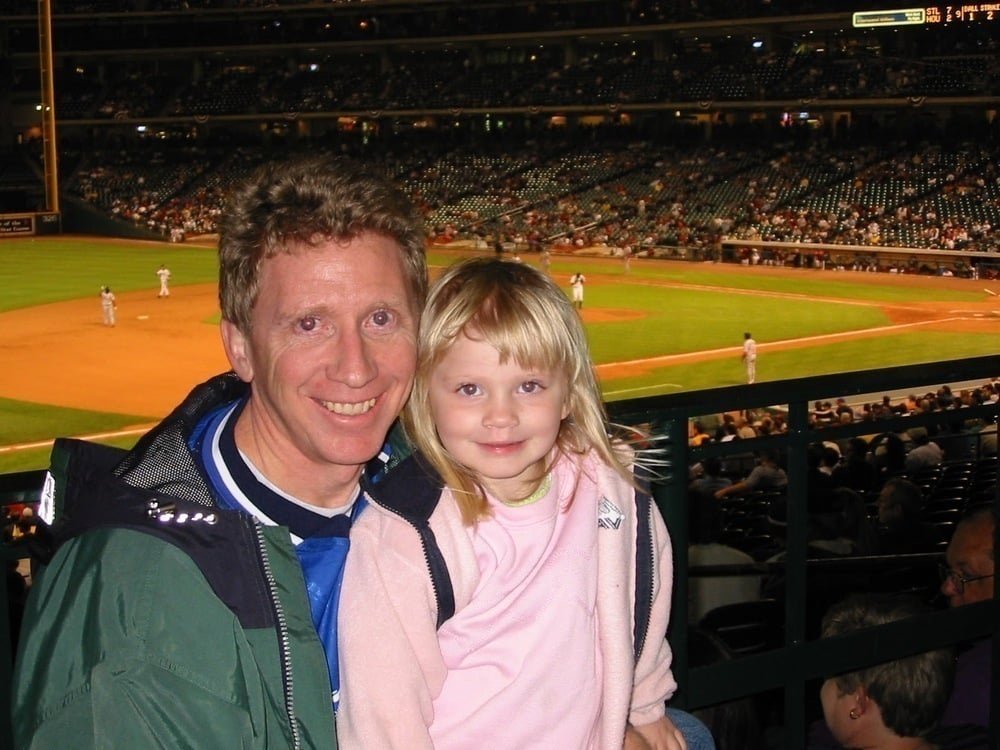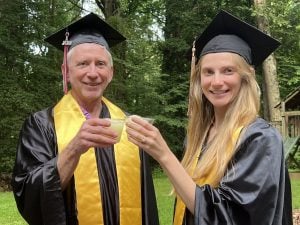
Don Grage was helping his daughter Casey Qadir with an assignment for her online graduate program in applied and computational mathematics a few years ago when she presented him with an idea: enrolling as a student himself.
“Casey’s program was through the Whiting School of Engineering’s Engineering for Professionals program, and I was fascinated by what she was working on,” Grage recalls. “And then at one point, Casey said, ‘Dad, you are actually as excited about this content as I am. Why don’t you join the program with me?’
At first, the idea seemed silly. After all, Grage had earned a master’s in business administration 30 years ago and had been a managing partner and tech lead for 9Ware, a data management company, for 21 years.
“But then I woke up the next morning thinking that it would be a fun challenge and enjoyable to do it with my daughter,” he says.
Last May, the pair walked across the stage at the Whiting School of Engineering’s Master’s Recognition Ceremony, making history as the first father-daughter pair to earn master’s degrees in applied and computational mathematics together.
“It was so much more fun doing the program with my dad,” says Qadir. “It was a cool way to keep in touch very regularly because we didn’t live in the same state and studying together gave us an established mechanism to stay connected.”

Qadir had started the program during the early days of the pandemic and described it as the “perfect program” to complement—and distract from—the demands of her recently launched neurosurgical device company, Hubly Surgical, which she co-founded and runs as CEO.
“In business and medical hardware, you’re learning a lot, but it’s different. This was a way to use a different part of my brain than I usually do day-to-day,” she explains.
“I decided that since everything was going virtual, it would be a good time to do a part-time master’s and started researching the kind of program I wanted. The [Engineering for Professional program] was exactly what I wanted, and it had always been virtual. I realized that this was an established program run by people who knew what they were doing—it wasn’t just a last-minute format they were trying to figure out.”
For Grage, the decision to return to the classroom was a little trickier.
“All my friends asked me, ‘Why are you doing this to your daughter?” he says. “I told them, ‘She asked me to do it and she was sincere!’ They would say, ‘Are you sure? Because my kids would never want me to be part of their program.’”
Enrolling forced Grage to dust off his academic skills, last honed when he earned his MBA after completing an undergraduate degree in physics more than three decades ago.
“9Ware, my current company, is very small, so I do a lot of software development, data structure analysis, data analytics, and other business issues. But [these ACM courses] challenged my brain in a lot of different ways,” he says.
One of the aspects that both father and daughter found particularly rewarding was the relationship they developed with Thomas Woolf, their advisor and ACM program manager.

During their weekly meetings, Woolf shared supplementary research and information and helped Qadir and Grage explore how class-based learning could be applied to real-world scenarios.
“It really helped me get so much more out of the program, instead of just viewing the content as homework,” Qadir says.
In addition to sharing a love for mathematics, the father and daughter also clearly respect and appreciate each other.
“My dad is my inspiration for why I wanted to even go into math and science and STEM fields to begin with, and where I got my love for technology and innovation,” Qadir says.
“More important than being naturally talented at math and science, he just loves the material and that is the most important thing. He genuinely enjoys learning and thinks of it as a hobby, so he’s the reason I also think of it as a hobby and not as a chore … I got so much more out of the class because my dad was in it.”
Grage was equally positive about his daughter’s talents. “Casey is not only brilliant, she also has a strong knack for very quickly understanding situations—whether they’re complicated or situational—and she has a natural ability to do whatever it takes in a situation,” he says.
Qadir summed it up this way: “Basically, we’re both big nerds.”